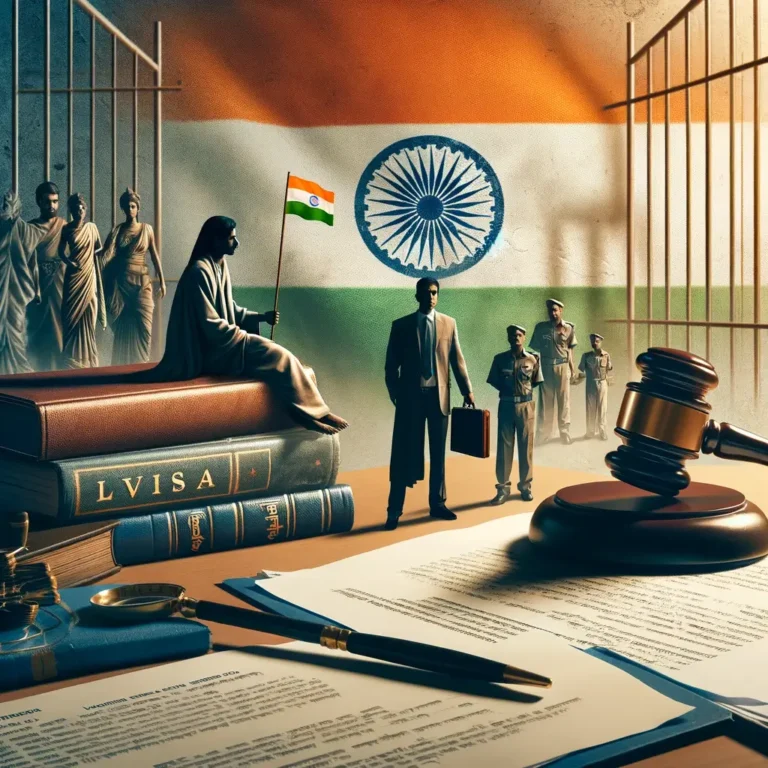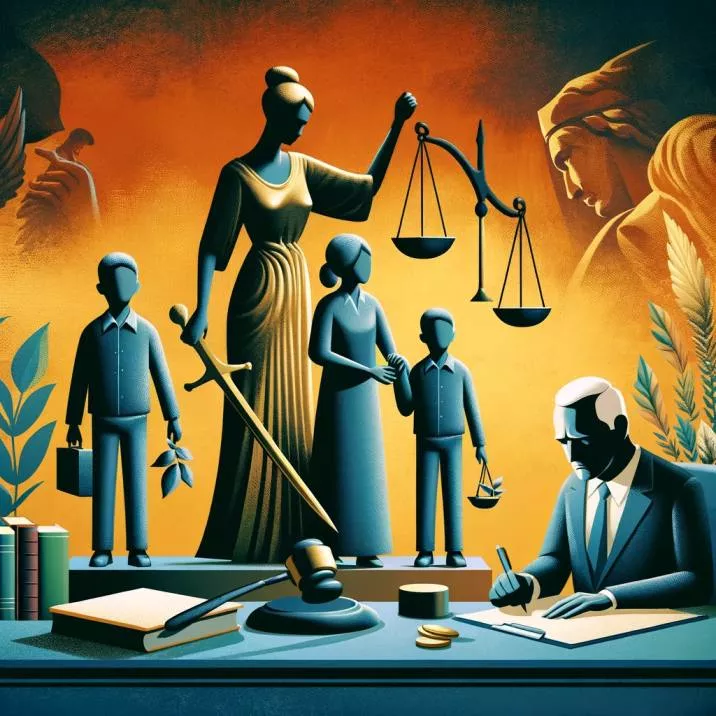In this article we have explained Role of Gang Rape Case Lawyer Specializing in Justice for Accused
Introduction
Gang rape cases are among the most heinous and complex legal matters. They not only devastate the lives of victims but also pose significant challenges in the judicial process. In such scenarios, the role of a specialized gang rape case lawyer, particularly one focusing on defending the accused, becomes crucial. This article aims to shed light on the pivotal role these lawyers play in ensuring justice and fairness in the legal system.
Role of Gang Rape Case Lawyer Specializing in Justice for Accused
Upholding the Principle of Innocent Until Proven Guilty
- Legal Representation: The lawyer ensures that the accused individuals receive fair and competent legal representation throughout the legal proceedings. They advocate for the presumption of innocence and work diligently to protect the rights of their clients.
- Challenging Biases: In high-profile cases like gang rape accusations, public opinion and media coverage can heavily influence perceptions of guilt. The lawyer challenges biases and preconceptions surrounding the case, reminding everyone involved, including the judge, jury, and the public, of the fundamental right of the accused to be presumed innocent until proven otherwise.
- Due Process Advocacy: The lawyer ensures that due process is followed at every stage of the legal proceedings. They scrutinize evidence, challenge questionable testimonies, and advocate for the fair treatment of their clients in court.
- Countering Media Influence: In cases involving gang rape accusations, media coverage can be intense and often sensationalized. The lawyer works to counteract any prejudicial media narratives that may impact the impartiality of the legal process. They may refrain from making statements to the media that could prejudice the case or the public’s perception of their client’s innocence.
- Educating the Public: The lawyer may engage in educational efforts to help the public understand the importance of the presumption of innocence and the complexities of the legal system. By providing insight into the legal process and the rights of the accused, they contribute to fostering a more informed and fairer public discourse surrounding the case.
Navigating Complex Legal Waters
- Understanding Legal Frameworks: Gang rape cases involve a complex interplay of criminal, constitutional, and procedural laws. Lawyers specializing in this area meticulously study and understand the legal frameworks governing such cases, including statutes related to sexual assault, evidence rules, and constitutional protections.
- Analyzing Case Law: They delve into precedent-setting cases and legal interpretations relevant to gang rape allegations. By analyzing past rulings and judicial interpretations, they gain insights into effective legal strategies and potential pitfalls in their clients’ cases.
- Building Strong Defenses: These lawyers employ their knowledge of criminal law and trial procedures to construct robust defenses for their clients. This may involve challenging the sufficiency of evidence, questioning witness credibility, or presenting alternative narratives that cast doubt on the prosecution’s case.
- Negotiating Plea Deals: In some instances, negotiating plea deals may be in the best interest of the accused. Lawyers specializing in justice for the accused assess the strengths and weaknesses of the prosecution’s case and engage in plea bargaining to secure favorable outcomes for their clients while minimizing potential repercussions.
- Adhering to Ethical Standards: Amidst the complexities of gang rape cases, lawyers must uphold ethical standards and professional conduct. They maintain confidentiality, avoid conflicts of interest, and zealously advocate for their clients within the bounds of the law.
- Managing Public Perception: Given the sensitive nature of gang rape cases, lawyers must navigate public scrutiny and media attention ethically and strategically. They may provide measured statements to the press or refrain from engaging with media outlets to safeguard their clients’ rights and preserve the integrity of the legal process.
- Leveraging Expertise and Resources: Lawyers specializing in justice for the accused collaborate with investigators, expert witnesses, and other legal professionals to bolster their defense strategies. They leverage their networks and resources to gather evidence, conduct thorough investigations, and counter prosecution arguments effectively.
Protecting the Rights of the Accused
- Due Process Advocacy: Lawyers ensure that the accused individuals receive due process under the law. This includes the right to a fair trial, the right to confront witnesses, the right to legal representation, and protection against self-incrimination. They scrutinize every aspect of the legal proceedings to ensure that the accused’s rights are upheld.
- Presumption of Innocence: Upholding the principle of “innocent until proven guilty,” lawyers remind all parties involved, including the court, the jury, and the public, of the presumption of innocence. They work tirelessly to counteract any prejudicial assumptions or biases that may jeopardize the fair treatment of their clients.
- Legal Counsel and Defense: Lawyers provide comprehensive legal counsel and defense strategies tailored to the unique circumstances of each case. They advise their clients on their rights, potential legal options, and the implications of various decisions throughout the legal process.
- Protection Against Coercion and Abuse: Lawyers ensure that their clients are protected against coercion, intimidation, or abuse by law enforcement officials or other parties involved in the case. They advocate for the proper handling of evidence and adherence to legal protocols to prevent any violations of the accused’s rights.
- Challenging Unlawful Practices: If there are any instances of procedural irregularities or violations of constitutional rights, lawyers challenge them through appropriate legal channels. This may involve filing motions to suppress evidence obtained unlawfully or appealing decisions that infringe upon the accused’s rights.
- Confidentiality and Privacy: Lawyers maintain strict confidentiality and protect the privacy of their clients throughout the legal proceedings. They ensure that sensitive information shared by the accused is safeguarded and used only for the purpose of their defense.
- Mitigating Harsh Punishments: In the event of a conviction, lawyers advocate for mitigating factors to be considered during sentencing. They present evidence and arguments aimed at minimizing the severity of punishments imposed on their clients, taking into account factors such as remorse, mitigating circumstances, and prospects for rehabilitation.
- Post-Conviction Rights: Even after a conviction, lawyers continue to protect the rights of their clients by exploring avenues for appeal, post-conviction relief, or other legal remedies. They ensure that the accused’s rights are upheld throughout all stages of the legal process.
Challenges Faced by Lawyers in Gang Rape Cases
- Complex Legal Issues: Gang rape cases involve intricate legal issues related to criminal law, evidence, and procedural rules. Lawyers must navigate these complexities while building a strong defense for their clients.
- High Emotional Stakes: Gang rape cases often evoke strong emotions from the public, jurors, and even the legal teams involved. Lawyers must manage their own emotions while providing steadfast support to their clients, who may be experiencing significant distress.
- Media Scrutiny and Public Opinion: High-profile gang rape cases attract intense media scrutiny, which can influence public opinion and potentially prejudice the jury pool. Lawyers must carefully manage media interactions to protect their clients’ rights and preserve the integrity of the legal process.
- Bias and Prejudice: Clients accused of gang rape may face bias and prejudice based on the nature of the allegations. Lawyers must work diligently to challenge stereotypes and ensure that their clients are treated fairly and impartially by the court and jury.
- Witness Credibility: Establishing the credibility of witnesses, including the accused and alleged victims, can be challenging in gang rape cases. Lawyers must conduct thorough investigations and effectively cross-examine witnesses to uncover inconsistencies and discrepancies in their testimony.
- Handling Sensitive Evidence: Gang rape cases often involve sensitive and graphic evidence that can be emotionally distressing for all parties involved. Lawyers must handle this evidence with sensitivity while ensuring that it is presented effectively in court to support their clients’ defense.
- Coordinating Complex Defense Strategies: Defending against gang rape allegations requires a coordinated and multifaceted defense strategy. Lawyers must work closely with expert witnesses, investigators, and other legal professionals to build a compelling case on behalf of their clients.
- Navigating Plea Bargaining and Sentencing: In some cases, negotiating plea deals or advocating for leniency in sentencing may be in the best interest of the accused. Lawyers must carefully weigh the potential benefits and risks of such options while prioritizing their clients’ interests and well-being.
- Ethical Dilemmas: Lawyers may encounter ethical dilemmas in gang rape cases, such as conflicts of interest or confidentiality concerns. They must uphold the highest ethical standards and prioritize the interests of justice and fairness at all times.
Conclusion
The Crucial Role in Upholding Justice
The role of a gang rape case lawyer specializing in defending the accused is indispensable in the pursuit of justice. While the nature of these cases often evokes strong emotions, the legal system depends on skilled lawyers to ensure that every individual is given a fair trial. These lawyers play a critical role in maintaining the balance of justice, safeguarding the rights of the accused, and upholding the integrity
FAQ on Role of Gang Rape Case Lawyer Specializing in Justice for Accused
- What is the primary role of a gang rape case lawyer for the accused?
- The primary role is to ensure the accused receives a fair trial by thoroughly examining evidence, cross-examining witnesses, and presenting a robust defense.
- Why is specializing in gang rape cases important for some lawyers?
- Specialization is important due to the complexity and sensitivity of such cases, requiring deep understanding of criminal law and rights of the accused.
- How do these lawyers uphold the principle of ‘innocent until proven guilty’?
- They ensure the accused’s rights are protected, challenge the prosecution’s evidence, and advocate for the accused’s presumption of innocence.
- What challenges do lawyers face in high-profile gang rape cases?
- They face challenges like public sentiment against the accused, complex evidence analysis, and maintaining professional ethics.
- Do these lawyers only work with the accused?
- Primarily, yes, their expertise is in defending the accused in gang rape cases.
- How do gang rape case lawyers handle public and media scrutiny?
- They maintain professionalism, focus on legal facts, and often limit public statements to protect the integrity of the trial.
- Can these lawyers influence the severity of the sentence?
- They can argue for mitigating factors and fair sentencing if the accused is found guilty.
- What rights of the accused do these lawyers protect?
- Rights like a fair trial, protection against unlawful treatment, and maintaining dignity and privacy.
- Are gang rape defense lawyers always successful in their cases?
- Success varies based on case specifics; their goal is to ensure a fair trial, not necessarily acquittal.
- How do they prepare for a gang rape case?
- They gather and analyze evidence, strategize the defense, and prepare for witness cross-examinations.
- Do these lawyers need specific qualifications?
- They require a law degree and often additional training or experience in criminal defense and sensitive cases.
- How do they ensure impartiality in the courtroom?
- By challenging biases, ensuring objective evidence presentation, and advocating for the accused’s rights.
- What ethical considerations do these lawyers face?
- They must balance their duty to defend their client with legal and moral ethics.
- How do they deal with the emotional impact of these cases?
- Professional detachment and sometimes seeking support through peer groups or counseling.
- Can these lawyers represent someone they believe to be guilty?
- Yes, as their role is to ensure a fair trial and legal representation for all, regardless of personal beliefs.
- How long does it typically take to resolve a gang rape case?
- The duration varies greatly depending on case complexity, legal procedures, and jurisdiction.
- What is the role of forensic evidence in these cases?
- Forensic evidence can be crucial in proving or disproving allegations and is often a key focus for the defense.
- How do these lawyers interact with the victim’s legal team?
- Interaction is typically professional and limited to legal proceedings like court hearings and evidence exchange.
- Can these lawyers appeal a verdict?
- Yes, if there are grounds for appeal, such as procedural errors or new evidence.
- What impact does media coverage have on these cases?
- Media coverage can influence public opinion and potentially the jury, which lawyers need to carefully manage.
- How do gang rape case lawyers stay updated on legal practices?
- They engage in continuous education, attend legal seminars, and stay informed on current case law.
- Do these lawyers work alone or in teams?
- This varies; some work alone, while others may work with a legal team, especially in complex cases.
- How do they handle cases with multiple accused?
- Each accused typically has their own lawyer to ensure individual representation and avoid conflicts of interest.
- What role does digital evidence play in these cases?
- Digital evidence like texts, emails, and social media can be pivotal in constructing the defense or prosecution’s case.
- How do they address cross-examination challenges?
- By preparing thoroughly, understanding witness psychology, and having a deep knowledge of the case.
- Can these lawyers work on pro bono basis?
- Some may take on pro bono cases, depending on their personal and firm policies.
- How do they ensure confidentiality in sensitive cases?
- By adhering to legal confidentiality obligations and using secure communication methods.
- What’s the difference between public defenders and private lawyers in these cases?
- Public defenders are government-appointed for those who can’t afford private lawyers; private lawyers are often more specialized.
- How do they interact with law enforcement during investigations?
- Interaction is professional, ensuring their client’s rights are respected during the investigation.
-
What is the impact of these lawyers on the justice system?
They are essential for ensuring a balanced and fair justice system, representing the rights of the accused and the principle of a fair trial.
















